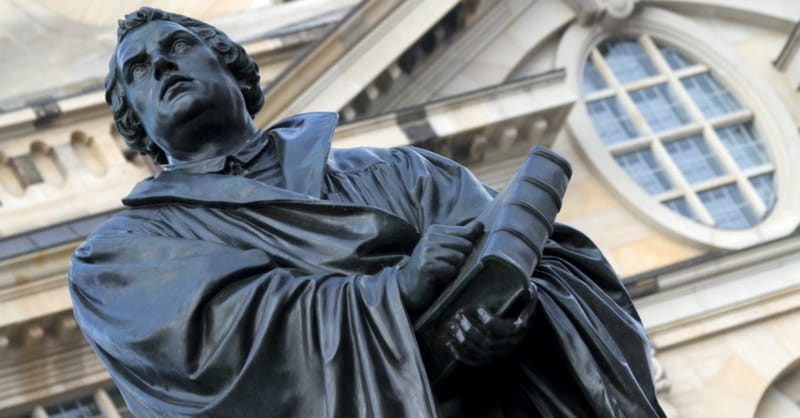
Martin Luther’s Five Solas solidified the doctrine of the Protestant Reformation: individuals had free access to God. Faith alone, grace alone, salvation alone through Christ was all possible once people understood that the basis for all truth is found in scripture alone. The Bible, not the state religion, provides the foundation for all knowledge. People no longer were enslaved to false promises and salvation through taxation. Rather, they could enjoy fellowship with other believers, and have freedom. Freedom to read, learn, and think for themselves. Freedom to work and love without the regulations and restraints enforced by the Roman Catholic Church.
In 1529 German princes officially “protested” against Rome, thus becoming called Protestants. Their acts following Luther’s initial protest is what Protestants worldwide celebrate and remember 500 years later on this Sunday, called Reformation Sunday.
The outworking of Luther’s transformation of the church was the emphasis of corporate worship. This meant that one could read– and sing– in one’s own language. The days of not being able to understand Latin or have access to knowledge were over. Martin Luther revolutionized praise and worship by teaching Christians how to read and sing.
Martin Luther wrote often about the importance of praising God through music and song. He said:
Next to the Word of God, the noble art of music is the greatest treasure in the world. … music deserves the highest praise. The gift of language combined with the gift of song was given to man that he should proclaim the Word of God through Music.
Music is a gift and grace of God, not an invention of men. Thus it drives out the devil and makes people cheerful. Then one forgets all wrath, impurity, and other devices.
Next to theology I give music the highest place of honor. As long as we live there is never enough singing.
Martin Luther wrote hymns and instituted singing– by the congregation– into all services. This was never done in the Roman Catholic Church. In fact, Luther wrote entire hymnals including carols for holidays. His influence on German hymnody was enormous; his repertoire included 37 hymns. United Methodist Hymnal editor Carlton R. Young remarked:
he “wrote several original hymns and melodies, revised many Latin hymns to German texts set to adaptations of plainsong and folk melodies, and encouraged the composition of new texts and rhythmic hymn melodies. His thirty-seven hymns and paraphrase are cast in simple, plain, and sometimes rough phrases and striking metaphors, qualities that are for the most part lost in English translations.”
Luther wrote five Christmas carols, initially for his children. He wrote From Heaven on High for his five-year-old son Hans, which was published a few years later. As part of his family’s Christmas Eve devotions, the children sang in response to a man dressed as an angel. His hymns and carols are a testament to his creative celebration of music.
His most well-known hymn, “Ein’ Feste Burg,” otherwise known as, A Mighty Fortress is Our God, was based on Psalm 46 and Luther’s own experiences. According to the Psalter Hymnal Handbook:
Stanzas 1-3 of the original text were inspired by Psalm 46; stanza 4 arose directly from Luther’s persecution experience. The text expresses trust in God’s protection amidst the battle that Christians wage against the devil. “Earthly powers” in stanza four undoubtedly referred to the Roman Catholic authorities of Luther’s day, but modern Christians may identity other “powers” that oppose the rule of Christ. The closing line of the text provides much comfort: “God’s truth abideth still; his kingdom is forever!”
A Might Fortress is Our God has been considered “the true National Hymn of Germany.” It was sung on the Leipzig battlefield in 1631 during the Thirty Years’ War (1618-1648). The famous nineteenth-century German poet, Heinrich Heine, considered this hymn comparable to France’s national anthem, calling it, “the Marseillaise Hymn of the Reformation.” It’s still referred to as the Battle Hymn of the Reformation:
Imagine no choirs, no carols, no singing in church. No praise and worship bands. No reading hymnals. Martin Luther, and the Protestant Reformation made this possible. The legacy of singing in church is directly credited to Luther and his counterpart reformers in other European countries.
Photo courtesy: ©Thinkstock/BookyBuggy
Slideshow based on a series of articles by Bethany Blankley. Used with permission.
Bethany Blankley is a former Capitol Hill staffer, Fox News Radio political analyst, public speaker and commentator on Christianity and politics in America. Her commentary can be read in The Washington Times (Axis Mundi), Townhall, Religion Today, Patheos (Hedgerow), Charisma News, Christian Headlines, Beliefnet, among others. Her book, What Every Christian Needs To Know About Islam, is forthcoming.
Follow her @bethanyblankley, www.facebook.com/
